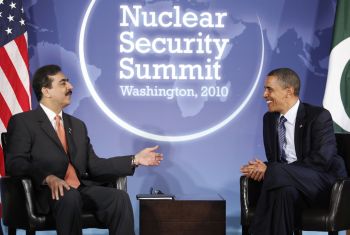 US President Barack Obama on Sunday asked Pakistani Prime Minister Yusuf Raza Gilani to bring the perpetrators of the Mumbai terrorist attacks to justice, saying this would help improve the security situation in the region.
US President Barack Obama on Sunday asked Pakistani Prime Minister Yusuf Raza Gilani to bring the perpetrators of the Mumbai terrorist attacks to justice, saying this would help improve the security situation in the region.
Obama also did not commit any civilian nuclear deal with Pakistan on the lines of that of India.
Meeting Gilani, more than two hours after his meeting with the Indian Prime Minister, Obama told the high-level Pakistani delegation that Manmohan Singh was sincere in improving ties with Islamabad, but wants Pakistan to take action against those responsible for the Mumbai attacks.
"Obama said he feels that Prime Minister Singh is sincere in his desire to engage Pakistan, but he (Singh) wants Pakistan to move against those responsible for the Mumbai attacks," said a source referring to the deliberations that went inside the two delegations for about 40 minutes at the Blair House.
Obama is believed to have said that he also personally believes that Pakistan taking action against those responsible for the Mumbai terrorist attack "would be a positive thing", sources said, adding that there was no commitment to the Pakistani leaders when Gilani raised the issue of a civilian nuclear deal with the US on the lines of that of India to meet its acute energy needs.
During the meeting the US President is understood to have spoken on his desire to have an improved Indo-Pak relationship arguing that he believes that this would have a positive impact on the overall situation in the region.
Noting that both India and Pakistan are sovereign nations, Obama felt that improvement in Indo-Pak relationship is beneficial to both of them.
Gilani is understood to have argued that Pakistan qualifies for such a nuclear deal and this would help it resolve its acute energy shortage. The Pakistani delegation included Foreign Minister Shah Mahmood Qureshi, Pak Ambassador to the US Hussein Haqqani, and Pak Ambassador to China Masood Khan.
Besides Obama, the US delegation included Secretary of State Hillary Clinton, National Security Advisor Gen (rtd) James Jones, and Chief of Staff Rahm Emanuel. Later briefing the Pakistani media, Gilani termed the meeting as very positive. During the meeting, Gilani invited Obama to Pakistan, which he accepted.
A date would be announced later.
"Obama began by noting that he is very fond of Pakistan, having visited the country during college," the White House said in a statement later.
"The President discussed with the Prime Minister (Gilani) the bilateral progress made during the March 24-25 Strategic Dialogue and reiterated the US pledge to work with Pakistan to address issues of mutual concern in the long-term relationship," the White House said.
" Gilani also indicated his approval of the progress made during the Strategic Dialogue and his hope that the working groups that have been established to address various aspects of the relationship would yield progress in advance of the next Strategic Dialogue meeting, scheduled for late 2010 in Islamabad," it said.
According to the White House, Gilani indicated his assurance that Pakistan takes nuclear security seriously and has appropriate safeguards in place.
When Gilani raised the issue of civilian nuclear deal, Obama is believed to have said that there is need to have a proper balance between progress and security concerns. The Pakistani officials later said that the US President told them that he is satisfied with the measures taken by Islamabad for the safety and security of its nuclear weapons.
Image: Barack Obama with Pakistani Prime Minister Yusuf Raza Gilani during the nuclear summit in the US.
Photograph: Reuters






 © 2025
© 2025